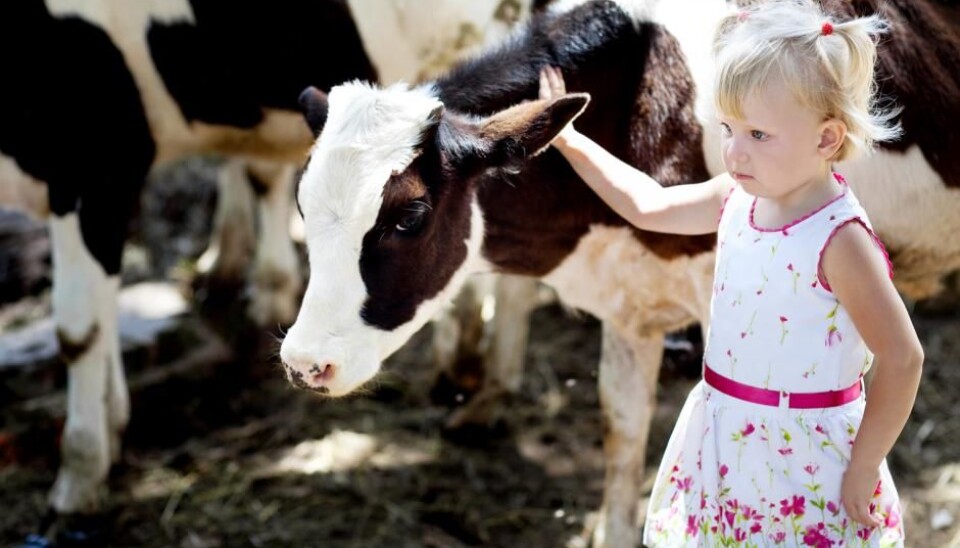
Rural upbringing protects against asthma and allergies
Children born in in the countryside often have fewer allergies and asthma than kids born in cities, shows new research.
Hay, cow muck, flies, and pollen. The country air is full of bacteria and allergens, so you might be thinking that children who grow up around the farmyard are extra vulnerable to asthma and other allergies.
You’d be wrong.
Research shows that the exact opposite is true and that city kids have a much greater risk of developing allergies and asthma as adults than people who grew up in the countryside.
This is now confirmed by a new study, which concludes that a rural upbringing protects children against irritated airways and allergies later in life.
“It looks like the way we live has an impact on the type of diseases we get. There is no longer any doubt that people who grow up in the countryside suffer less from allergic asthma or allergies,” says co-author Professor Vivi Schlünssen from the Department of Public Health - Institute of Environmental and Occupational Medicine, Aarhus University, Denmark.
“A plausible explanation could be that farm kids’ immune systems are strengthened by the e meeting of all the different bacteria and allergens during their upbringing--perhaps as early as the foetal period. But that’s still just a hypothesis,” she says.
The new results are published in the scientific journal Thorax.
Read More: New cure for rare childhood diseases enters final phase of trials
City kids are twice as vulnerable
Schlünssen and colleagues studied the occurrence of asthma and allergies in 10,021 adults between the age of 26 and 54 from 14 different countries. They also measured the participants’ lung function.
They asked each of the participants whether they grew up on a farm, in a rural environment, or in the inner city.
People who had spent the first five years of their lives on a farm suffered from fewer allergies and allergic asthma than people from the two other groups.
Further data crunching showed that adults who spent their early years on a farm were less prone to hay fever and hyper-reactive airways than those who had lived in a city for the first five years of their lives. And farm kids were also half as likely to develop allergies or allergic asthma.
Read More: Smoking fathers increase asthma-risk in future kids
New study confirms earlier results
The new study is the latest in a series of scientific investigations, showing that a rural upbringing can protect against allergic diseases and asthma.
In 2011, a Danish study of 2,000 agriculture students showed that the students who had grown up on a farm were 50 per cent less likely to develop asthma and allergies as students who had grown up in towns and cities.
Clinical Professor Lars Poulsen from the Department of Clinical Medicine at the Copenhagen University Hospital Gentofte in Denmark is not surprised by the new results.
“The study states that a countryside upbringing protects against asthma and allergic asthma. On top of this, it shows a consistent pattern across nations,” says Poulsen, who was not involved in the study.
“The next step is to investigate why people raised in the country have fewer antibodies. If we can identify these factors then we might be able to do some prevention in the urban environments,” he says.
Read More: Granny’s smoking increases grandchildren’s risk of asthma
Rural women have better lung function
But the new study did not just confirm old truths. They also monitored the test participants’ lung function and here, too, discovered a difference between the urban and rural--but only among women.
Women who had lived on a farm during the first five years of their lives had better lung function than women who grew up in a large city. Surprisingly, there was no difference among the male participants.
“This is a new discovery. It’s interesting and exciting that there is a difference between boys and girls,” says Poulsen.
Read More: No link between allergies and deadly diseases
Possible explanation: men are exposed to more bacteria
The scientists cannot say why a rural upbringing is apparently only advantageous for womens’ lung capacity.
One reason could be that men experienced a greater exposure to dust and bacteria if they spent more time in the stables than women. But this is pure speculation.
“It’s one hypothesis. Since it’s purely an observational study, we can’t be sure of the causes,” says Schlünssen.
“We’ve also seen in previous studies that men and women can react differently to environmental factors,” she says.
Read More: The farmhouse protects against asthma and allergies
Pregnant in the city? Take a farm stay vacation!
For the same reason, Schlünssen is hesitant to make any firm recommendations on the basis of the new results.
“We have strong reasons to believe that the immune system benefits from exposure to bacteria and allergens when it’s under development. That’s why we believe that it’s good to be exposed to a variety of bacteria and allergens that exist in the countryside,” she says.
The immune system develops during the foetal period and while children are still very young.
“If you are pregnant and you live in the city or if you have small children, it’s a good idea to get exposure to these good bacteria and allergens--for example by taking a trip to the country or staying there for short periods,” says Schlünssen.
-------------
Read the Danish version of this article on Videnskab.dk
Translated by: Catherine Jex
Scientific links
- Thorax 2016: The effects of growing up on a farm on adult lung function and allergic phenotypes: an international population-based study. doi: 10.1136
- NEJM 2016: Innate Immunity and Asthma Risk in Amish and Hutterite Farm Children. doi: 10.1056













